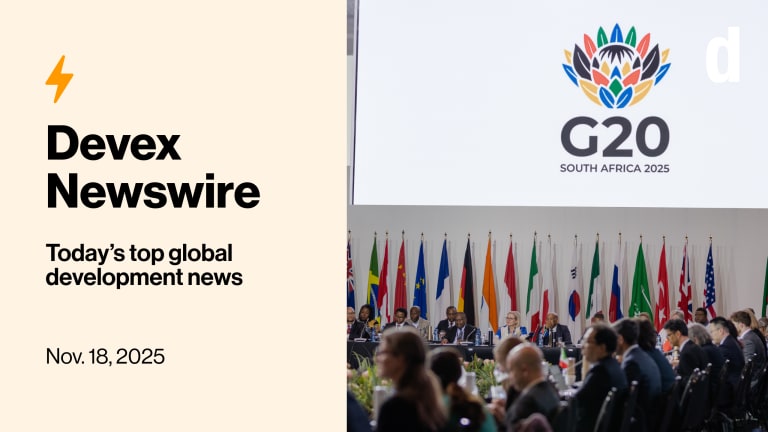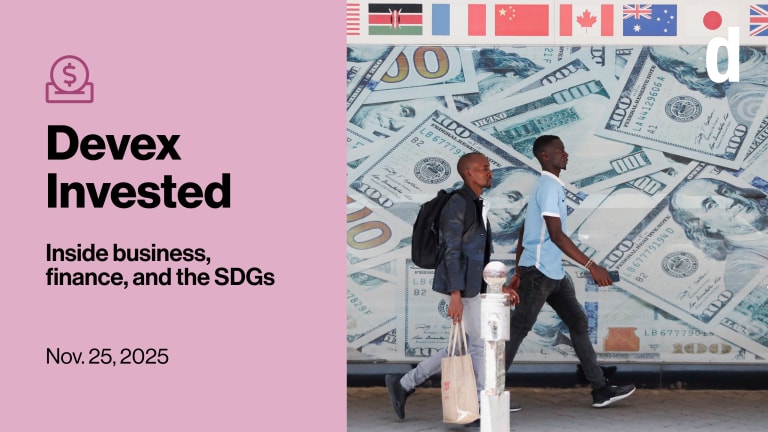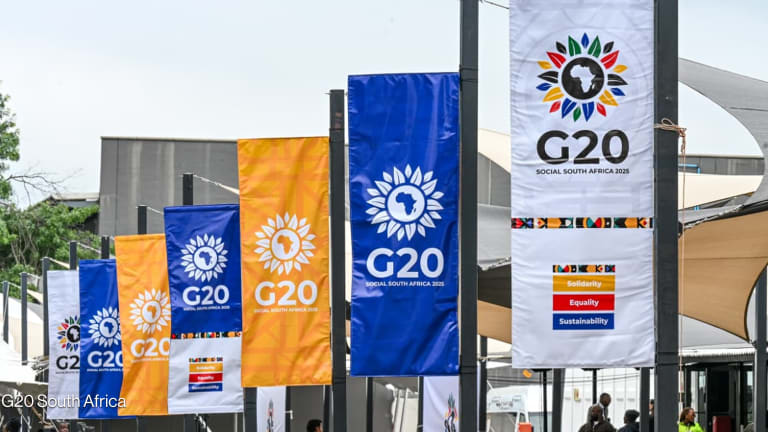Devex Newswire: AfDB faces big changes — and even bigger challenges
Presented by Boehringer Ingelheim

A new era is beginning at the African Development Bank. On Monday, Mauritanian economist Sidi Ould Tah officially took the helm, promising to cut red tape, strengthen partnerships, and expand access to finance with a focus on women and youth.
But Tah inherits the job at a moment of deep strain: African countries are facing climbing debt, escalating conflict, and climate shocks across the continent — not to mention the potential loss of a $555 million U.S. contribution.
Also in today’s edition: South Africa launches a G20 inequality commission, Africans continue to deal with travel barriers, and aid leaders call for reinvention in the wake of donor cuts.
+ Join us today at 9 a.m. ET (3 p.m. CET) for a Devex Career event that takes a look at how development consulting is changing and what you need to know to make smart, strategic career decisions. Save your spot now.
Banking on Tah
Sidi Ould Tah has taken over the reins at the African Development Bank, a development finance institution that works to reduce poverty, improve living conditions, and mobilize resources across the continent.
Tah is the former president of the Khartoum-based Arab Bank for Economic Development in Africa, or BADEA. Now he’s bringing that experience to AfDB, my colleague Ayenat Mersie reports — and in Tah’s inaugural address in Côte d’Ivoire on Monday, he told the crowd what to expect.
“The African Development Bank Group cannot aim to be everything to everyone,” Tah said. “We should work hand-in-hand with government, private sector, and our international partners, not in isolation but in synergy, so that together we create a financial framework that serves Africa on its own terms.”
Tah laid out four priorities for his first 100 days. The first was listening to shareholders, partners, and staff; the second was accelerating reforms to reduce bureaucratic delays. The third was strengthening partnerships to mobilize capital, including through the replenishment of the AfDB’s concessional lending arm. And the fourth was expanding access to finance to spark job creation, with a specific focus on women and young people.
None of that is going to be easy, Ayenat writes: Tah comes into his new role just after the United States announced they would be pulling a $555 million contribution from the AfDB — and at the same time that the continent is grappling with ever-climbing debt, conflict, and climate impacts. But given Tah’s experience at BADEA, he might be exactly what the AfDB needs.
“Tah’s election reflects a clear shareholder pivot toward Gulf capital,” wrote Tom Bonsundy-O’Bryan of the Atlantic Council. “His landslide win signals a strategic consensus among shareholders: Future-proofing the Bank means diversifying, moving away from Western donors.”
Read: New AfDB president inherits a bigger bank — and tougher challenges
ICYMI: The bow tie bows out — Adesina’s 10 years at AfDB
Doubling down on inequality
Côte d’Ivoire isn’t the only African country buzzing with announcements. In South Africa, the G20 presidency launched a committee of independent experts to deliver the first report on global inequality to the leaders of the Group of 20 leading economies, plus the European Union and the African Union.
“People across the world know how extreme inequality undermines their dignity and chance for a better future,” said South African President Cyril Ramaphosa in a recent statement. “South Africa’s G20 Presidency today is proud to launch an initiative that will target this issue of global wealth inequality — a first for the G20 — and offer a practical way forward.”
The report will be presented to world leaders at the G20 summit, which will take place in Johannesburg, South Africa, this November. By analyzing the state of wealth and income inequality across the world today — and assessing the impacts on growth, poverty, and multilateralism — the report aims to provide a menu of solutions to G20 leaders, according to a statement from the South African government.
“Inequality has widened to extremes that threaten democracy itself and should be a concern of all of us,” said Joseph Stiglitz, the economist leading the report, in a statement. “Our task must now be to translate the evidence and public’s palpable anger at the great divide into sound, practical and transformative policy proposals for G20 leaders.”
Inequality has been a major theme for South Africa since it took over the G20 presidency. The continent faces a crushing inequality crisis, with Africa’s four richest people holding more wealth than half of the region’s 750 million people combined, according to data from international aid group Oxfam. So too does the rest of the world, with the South Africa presidency noting that the world’s richest 1% have increased their wealth by more than $33.9 trillion in a single decade — enough to eliminate global annual poverty 20 times over.
“Inequality was always a choice – and G20 nations have the power to choose a different path, on a range of economic and social policies,” Stiglitz added.
Background reading: What will the first African G20 presidency look like?
Grounded before takeoff
The G20 summit will take place in South Africa this November. Of course, delegates from across the G20 countries — including leaders from the United States, Canada, Japan, and Australia — are unlikely to face problems getting to Johannesburg. But for those leaving the continent to attend events across the world, it’s often a very different story.
Visa restrictions, limited institutional support, and exorbitant costs often bar African leaders from attending the events that affect their continent the most. It’s something that advocates have been pushing against for years, especially after dozens of delegates were denied Canadian visas to attend the Montreal AIDS conference in 2022.
That’s one of the reasons why the International AIDS Conference selected Rwanda’s capital as the home of their 2025 summit in July, bringing thousands of scientists, students, and activists to the beautiful city of Kigali. The location resulted in a near-doubling of African participants when compared to the conference’s Australia venue in 2023.
But once the conference ended, many were left to wonder: Was it enough?
“Even with the Kigali location, many paid out of pocket to attend,” says Obi Chima, a health informatics manager with the Society for Family Health Nigeria. “That’s not sustainable.”
Despite the International AIDS Conference providing 247 in-person and virtual scholarships to participants from 63 countries, many were still unable to attend due to cost and regional visa restrictions, writes Devex contributing reporter Paul Adepoju. Nearly half of all African travelers require a visa before visiting another African country, and while dozens have improved their openness over the last decade, eight countries have done the opposite.
“If I face this much trouble entering Europe or America, I might understand,” says Ifeanyi Omah, a Nigerian virologist who had hoped to attend other conferences in South Africa and Ethiopia but got his visa denied. “But to face it within Africa as an African? That’s heartbreaking.”
Read: Can Africa host its way to inclusion?
Tough love
Whether it’s African scientists struggling to cross borders or nonprofits struggling to regain trust, the challenges point to a sector under strain — and in search of new ways forward. After months of historic donor cuts, aid leaders say the sector is facing a make-or-break moment: It must find a way to stay relevant, and at this point, that might mean a reinvention of its biggest players.
Speaking at a Devex Pro event Friday, Nithya Ramanathan, CEO of Nexleaf Analytics, pointed to an unlikely source of inspiration: the Joe Rogan podcast. Its massive reach, she argued, is a reminder of how far the industry has drifted from accessible communication. “Our sector has lost the ability to be relevant, generally,” she said.
Others echoed the call for recreation. Sasha Dichter, CEO of 60 Decibels, stressed that aid groups can no longer treat listening as a box-ticking exercise for monitoring and evaluation. Instead, he said, it must become a central design principle — shaping how programs are conceived, delivered, and measured against the needs of the people they’re meant to serve.
Watch: How can we reinvent aid? (Pro)
Related: How do we fix aid? (Pro)
+ Not a Devex Pro member yet? Start your 15-day free Pro trial today and gain immediate access to in-depth analyses, insider insights, crucial funding data, exclusive event access, and much more. Discover all the exclusive content available to you.
In other news
A new report warns that the financing of transition mineral mining used to produce clean energy technologies is driving extensive environmental damage and human rights violations, as weak environmental, social, and governance policies leave communities and ecosystems unprotected. [The Guardian]
Burkina Faso’s military-controlled Parliament unanimously passed on Monday a law amending the family code to criminalize homosexuality. [BBC]
Education aid is projected to fall by 24%, or about $3.2 billion, from 2023 levels, a cut that could leave an additional six million children out of school by 2026. [UN News]
Sign up to Newswire for an inside look at the biggest stories in global development.
Search for articles
Most Read
- 1
- 2
- 3
- 4
- 5








